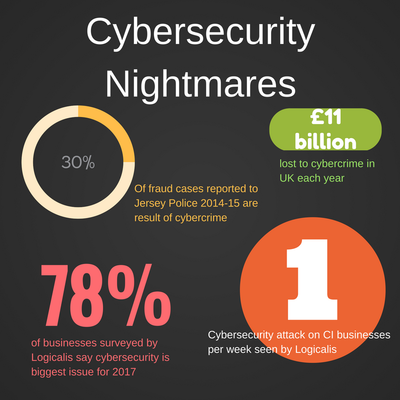

Logicalis has warned Islanders that banking scams are not just a scary story for Halloween.
Global IT specialists Logicalis say waking up and finding your bank account has been cleared out is everyone’s worst nightmare, but realising you’ve been the victim of a scam, and might never see your money again, is an even creepier sequel.
States of Jersey Police has warned people there have recently been a number of email scams sent to Islanders designed to appear like they have been sent by banks. The professional-looking emails ask customers to update their security details but will take you to a website that criminals can use to glean your details.
Logicalis say cases like this are not rare as 30% of fraud cases reported to Jersey Police in 2014-15 were the result of cybercrime, while a recent survey by Logicalis revealed cybercrime is the biggest threat to business, affecting at least one business in the Channel Islands every week.
Ricky Magalhaes, Head of Offshore Security, Logicalis, said: “Phishing is a massive issue for individuals and for businesses. The scams are increasingly sophisticated. They used to frequently come as shopping or shipping notices, that would deliver a virus to your computer if you opened them. These were easier to avoid because you’d know if you’d ordered something or not; when something looks like it’s from a bank you use, you might be less likely to ignore it.
“However, banks will never ask you to click on an email and log in. If you have the slightest doubt about an email, delete it, and call your bank using the main number, not on any number listed in the email. Fraudsters rely on your curiosity – if you’re not expecting an email from an organisation don’t click on any links.”
Signs an email may be fake include the senders’ email address not matching with the bank’s website address, requests for personal information, such as a username or password, spelling or grammatical errors, non-specific greetings e.g. ‘Dear Customer’ and attempts to create a sense of urgency such as saying your account will be closed if you don’t act immediately.
As well as phishing emails from organisations, fraudsters also use ‘fun’ videos or graphics about current events to get you click on their links.
Mr Magalhaes said: “Fraudsters hijack current events that they know people are interested in such as the World Cup, The Olympics, or even Halloween, to get them to go to fake sites, or to open attachments that contain viruses. Whether it’s an email, a website, or even a request to download an app, our message is the same – Think before you click!”
Comments
Comments on this story express the views of the commentator only, not Bailiwick Publishing. We are unable to guarantee the accuracy of any of those comments.